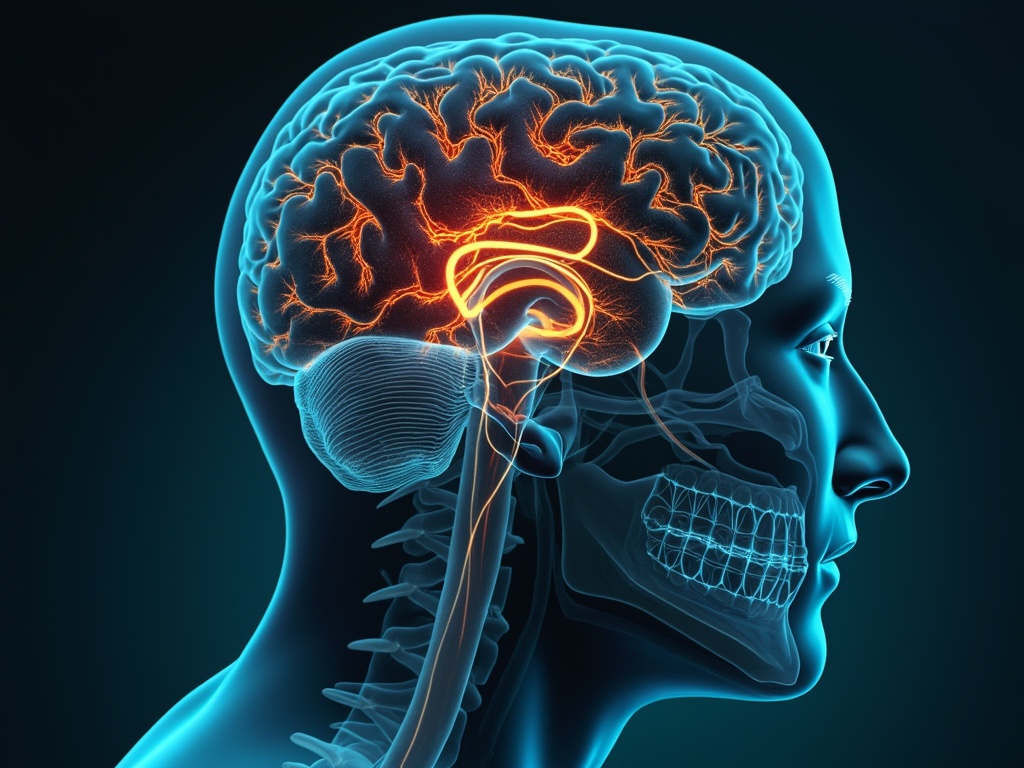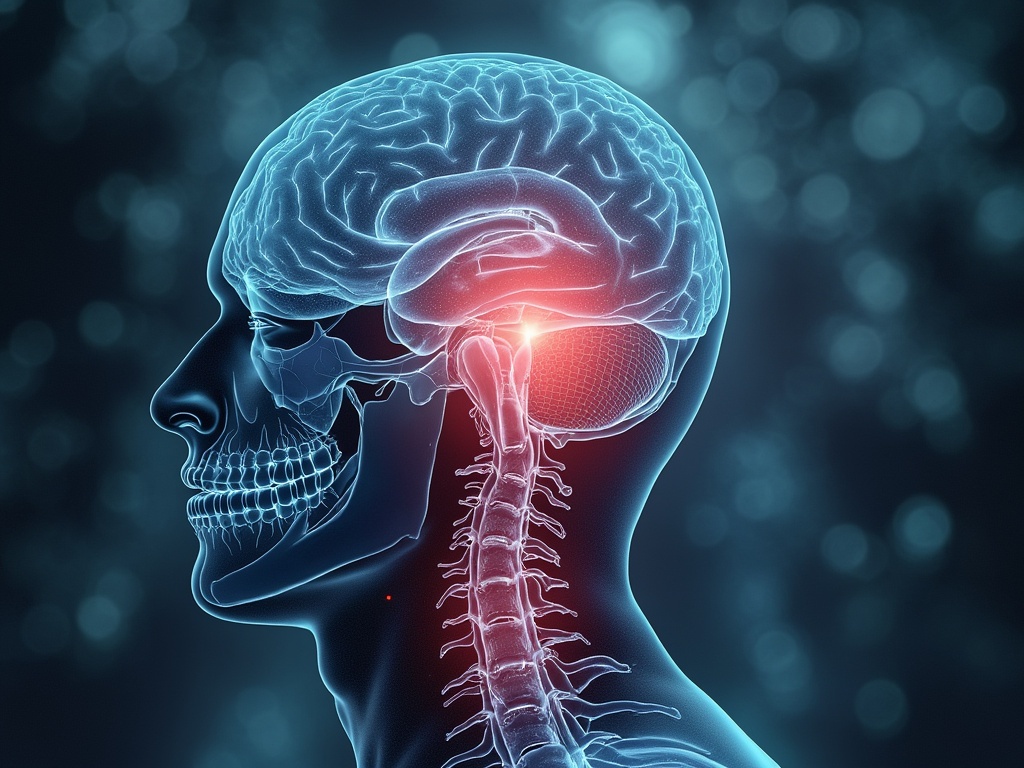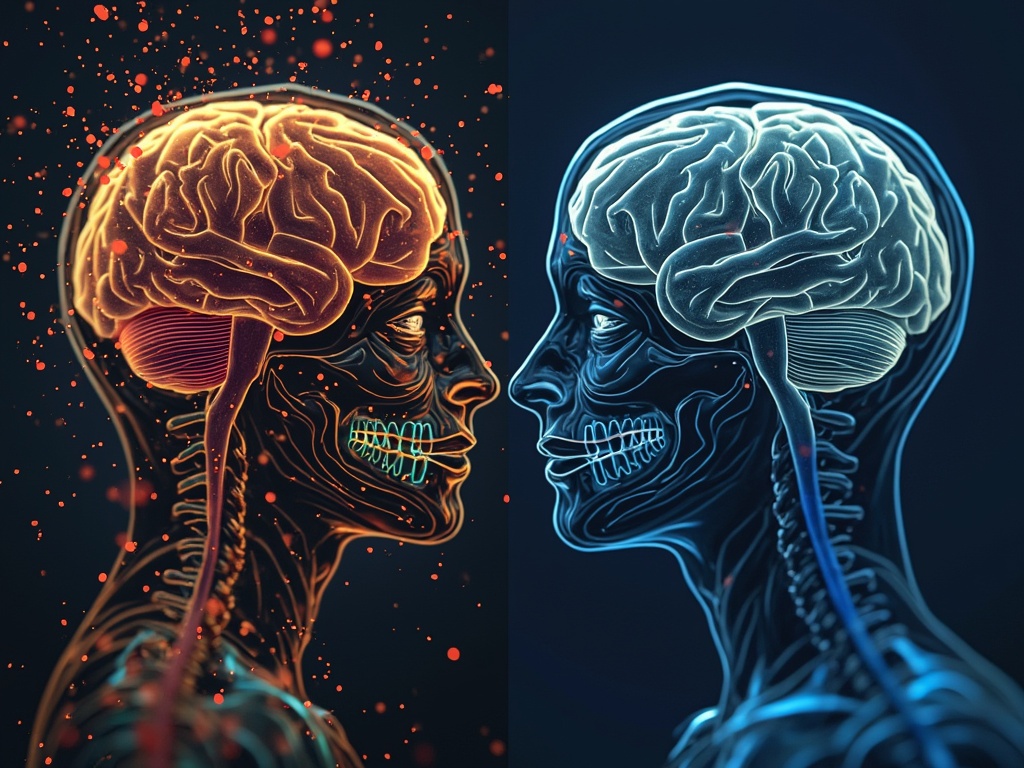Here’s the HTML formatted text:
Neuropathy’s effects ripple beyond physical discomfort, setting off a chain reaction that disrupts mental health – with anxiety impacting up to 60% of patients and depression striking more than half. The close link between nerve pain and emotional distress calls for a complete treatment strategy focusing on both bodily symptoms and mental wellness through gentle, natural approaches.
Key Takeaways:
- Standard neuropathy drugs disappoint, with just 25% of patients finding real relief
- Anxiety paired with depression strikes nearly one-third of neuropathy patients at the same time
- Natural options like acupuncture, herbal remedies, and targeted vitamin therapy show better promise than typical medications
- Daily movement and mindfulness techniques can interrupt the cycle of pain and anxiety
- Custom treatment plans that target both physical pain and emotional health produce the best outcomes for managing neuropathy
Understanding the Physical and Emotional Impact
Mental Health Statistics
Painful diabetic neuropathy creates significant mental health challenges. Research shows anxiety rates reach up to 60% in patients, while depression affects up to 50.6%. Nearly one-third of patients experience both conditions simultaneously, highlighting the intense psychological burden of this condition.
Common Emotional Challenges
Living with neuropathy triggers several emotional hurdles that impact daily life. Here are the primary concerns I see patients struggle with:
- Fear of increased pain during regular activities
- Worry about potential falls or injuries
- Anxiety about losing independence
- Stress over changing self-identity
- Concern about social isolation
These emotional responses can intensify physical symptoms, creating a cycle that affects overall quality of life. As a healthcare provider, I find that addressing both physical pain and emotional well-being leads to better outcomes. Supporting mental health is just as crucial as managing physical symptoms in neuropathy care.

Treatment Challenges and Modern Solutions
Breaking Free from Traditional Treatment Limitations
Standard neuropathy medications show limited success, with only 25% of patients experiencing meaningful relief. Half of all patients stop their prescribed medications within 12 weeks due to side effects or poor results. While conventional options like nortriptyline and duloxetine remain common first-line treatments, I’ve seen remarkable results through natural alternatives.
Here are proven natural solutions that support neuropathy healing:
- Acupuncture stimulates nerve regeneration and reduces pain signals
- Herbal medicine reduces inflammation without harsh side effects
- Benfotiamine, a specialized form of vitamin B1, repairs nerve damage
- Alpha-lipoic acid acts as a powerful antioxidant for nerve protection
These natural approaches offer hope for the 75% who don’t respond to traditional medications. By combining these treatments based on individual needs, I help patients find lasting relief without dependency on prescription drugs.

The Mind-Body Connection in Pain Management
Pain’s Impact on Mental Wellbeing
Physical pain and mental health share a deep connection that affects your daily life. I’ve seen how chronic pain can trigger anxiety, creating a cycle that intensifies both conditions. The brain processes pain signals differently when you’re stressed or anxious, making discomfort feel more intense.
Here are key factors that influence your pain experience:
- Stress levels directly affect pain sensitivity
- Emotional state can amplify or reduce pain signals
- Sleep quality impacts pain tolerance
- Social support influences pain management success
- Daily activities become harder with increased pain
By addressing both physical symptoms and mental health together, you’ll create a more complete healing strategy. My focus on mindfulness techniques combined with proper nerve care helps break the pain-anxiety cycle. Simple breathing exercises and gentle movement patterns can shift your body’s response to pain, leading to better outcomes.

Breaking the Cycle: Practical Solutions
Comprehensive Healing Strategies
I blend chiropractic care with stress management techniques to address neuropathy’s physical and mental impacts. Targeted spinal adjustments help restore proper nerve function while reducing pain signals to your brain. These adjustments, combined with specific breathing exercises and meditation, create a powerful healing approach.
Here are key strategies I recommend for managing neuropathy and mental well-being:
- Daily gentle stretching exercises focused on affected areas
- Five-minute mindfulness sessions before bed
- Regular chiropractic adjustments to maintain nerve health
- Short walks or low-impact movement three times daily
- Deep breathing exercises during pain flare-ups
Regular movement plays a crucial role in managing both neuropathy symptoms and mental health. Simple activities like stretching or walking can trigger the release of natural pain-fighting chemicals in your body while improving your mood and reducing anxiety levels.
Creating a Path to Recovery
Integrated Treatment Strategies
I’ve found that personalized care plans merging physical and mental health support deliver the best results for neuropathy patients. Your treatment journey should adapt based on daily pain levels and emotional well-being.
These key components create a solid foundation for recovery:
- Daily pain tracking with detailed symptom journals
- Mindfulness exercises paired with nerve pain management
- Stress reduction techniques for workplace situations
- Flexible scheduling for treatment appointments
- Regular sleep pattern monitoring
- Movement therapy adjusted to energy levels
Each step builds on the previous one, strengthening your ability to handle both physical discomfort and mental strain. By focusing on small, achievable goals, you’ll see improvements in work performance and overall life satisfaction. Remember, healing happens at your own pace – celebrating minor victories helps maintain motivation throughout recovery.

Sources:
Harvard Health Blog “Treating neuropathy: Which medication is best?”
National Health Service (NHS)
U.S. Department of Health and Human Services (HHS) “Healthy Border 2030”
Frequently Asked Questions
What is the impact of neuropathy on mental health?
Neuropathy can have a significant impact on mental health, leading to increased rates of anxiety and depression. Research indicates that up to 60% of patients with painful diabetic neuropathy experience anxiety, and up to 50.6% experience depression. Nearly one-third of patients face both conditions simultaneously, highlighting the intense psychological burden of neuropathy[1][2][5].
How does chronic pain from neuropathy affect daily life and emotional well-being?
Chronic pain from neuropathy can trigger several emotional hurdles, including fear of increased pain during activities, worry about potential falls or injuries, anxiety about losing independence, stress over changing self-identity, and concerns about social isolation. These emotional responses can intensify physical symptoms, creating a cycle that affects overall quality of life[1].
What are some natural alternatives to traditional medications for managing neuropathy?
Natural alternatives that have shown promise in managing neuropathy include:
- Acupuncture: Stimulates nerve regeneration and reduces pain signals.
- Herbal medicine: Reduces inflammation without harsh side effects.
- Benfotiamine: A specialized form of vitamin B1 that repairs nerve damage.
- Alpha-lipoic acid: Acts as a powerful antioxidant for nerve protection.
These approaches can offer relief for patients who do not respond well to traditional medications[1].
How does stress and emotional state affect pain perception in neuropathy?
Stress levels and emotional state can significantly affect pain perception. High stress levels can increase pain sensitivity, and an anxious or stressed emotional state can amplify pain signals. Conversely, good sleep quality, social support, and mindfulness techniques can reduce pain intensity and improve overall pain management[1].
What are some practical strategies for managing both neuropathy symptoms and mental well-being?
To manage both neuropathy symptoms and mental well-being, consider the following strategies:
- Daily gentle stretching exercises focused on affected areas.
- Five-minute mindfulness sessions before bed.
- Regular chiropractic adjustments to maintain nerve health.
- Short walks or low-impact movement three times daily.
- Deep breathing exercises during pain flare-ups.
Additionally, incorporating stress reduction techniques, movement therapy adjusted to energy levels, and regular sleep pattern monitoring can help create a comprehensive healing plan[1].
People Also Ask
How Common Are Mental Health Issues in People With Neuropathy?
Mental health issues are alarmingly common among individuals suffering from neuropathy. Research indicates that anxiety rates can reach up to 60% in patients, while depression affects up to 50.6%[1][5].
- Anxiety and Depression Coexistence: Nearly one-third of patients experience both anxiety and depression simultaneously, highlighting the intense psychological burden of neuropathy.
- Impact on Quality of Life: These mental health challenges can intensify physical symptoms, creating a cycle that significantly affects overall quality of life.
What Are the Primary Emotional Challenges Faced by People With Neuropathy?
Living with neuropathy triggers several emotional hurdles that impact daily life. Here are some of the primary concerns:
- Fear of Increased Pain: Fear of pain increase during regular activities is a significant concern.
- Worry About Falls or Injuries: Patients often worry about potential falls or injuries, which can exacerbate anxiety.
- Anxiety About Losing Independence: The fear of losing independence is a major emotional challenge.
- Stress Over Changing Self-Identity: Changes in self-identity due to the condition can cause significant stress.
- Concern About Social Isolation: Social isolation is another common concern, as patients may feel withdrawn due to their condition[1].
Are There Effective Natural Alternatives for Managing Neuropathy?
Yes, there are several effective natural alternatives for managing neuropathy that can offer relief when traditional medications fail. Here are some proven options:
- Acupuncture: Stimulates nerve regeneration and reduces pain signals.
- Herbal Medicine: Reduces inflammation without harsh side effects.
- Benfotiamine: A specialized form of vitamin B1 that repairs nerve damage.
- Alpha-lipoic Acid: Acts as a powerful antioxidant for nerve protection.
These natural approaches can provide hope for the 75% of patients who do not respond to traditional medications[1].
How Does Stress Impact Neuropathic Pain?
Stress plays a significant role in neuropathic pain management. Here’s how stress affects your pain experience:
- Increased Pain Sensitivity: High stress levels directly affect pain sensitivity, making the discomfort feel more intense.
- Emotional State: Your emotional state can amplify or reduce pain signals. Stress and anxiety can exacerbate pain.
- Sleep Quality: Poor sleep quality, often associated with stress, impacts pain tolerance.
- Social Support: Having strong social support can influence pain management success[1].
What Mind-Body Techniques Can Help Manage Neuropathy and Mental Well-being?
Several mind-body techniques can help manage both neuropathy symptoms and mental well-being. Here are some recommended strategies:
- Mindfulness Exercises: Daily mindfulness sessions, such as five-minute meditation before bed, can reduce stress and anxiety.
- Breathing Exercises: Deep breathing exercises during pain flare-ups can help manage pain and reduce anxiety.
- Chiropractic Care: Targeted spinal adjustments combined with stress management techniques can help restore proper nerve function and reduce pain signals.
- Regular Movement: Gentle stretching exercises and short walks or low-impact movement three times daily can trigger the release of natural pain-fighting chemicals and improve mood[1].

